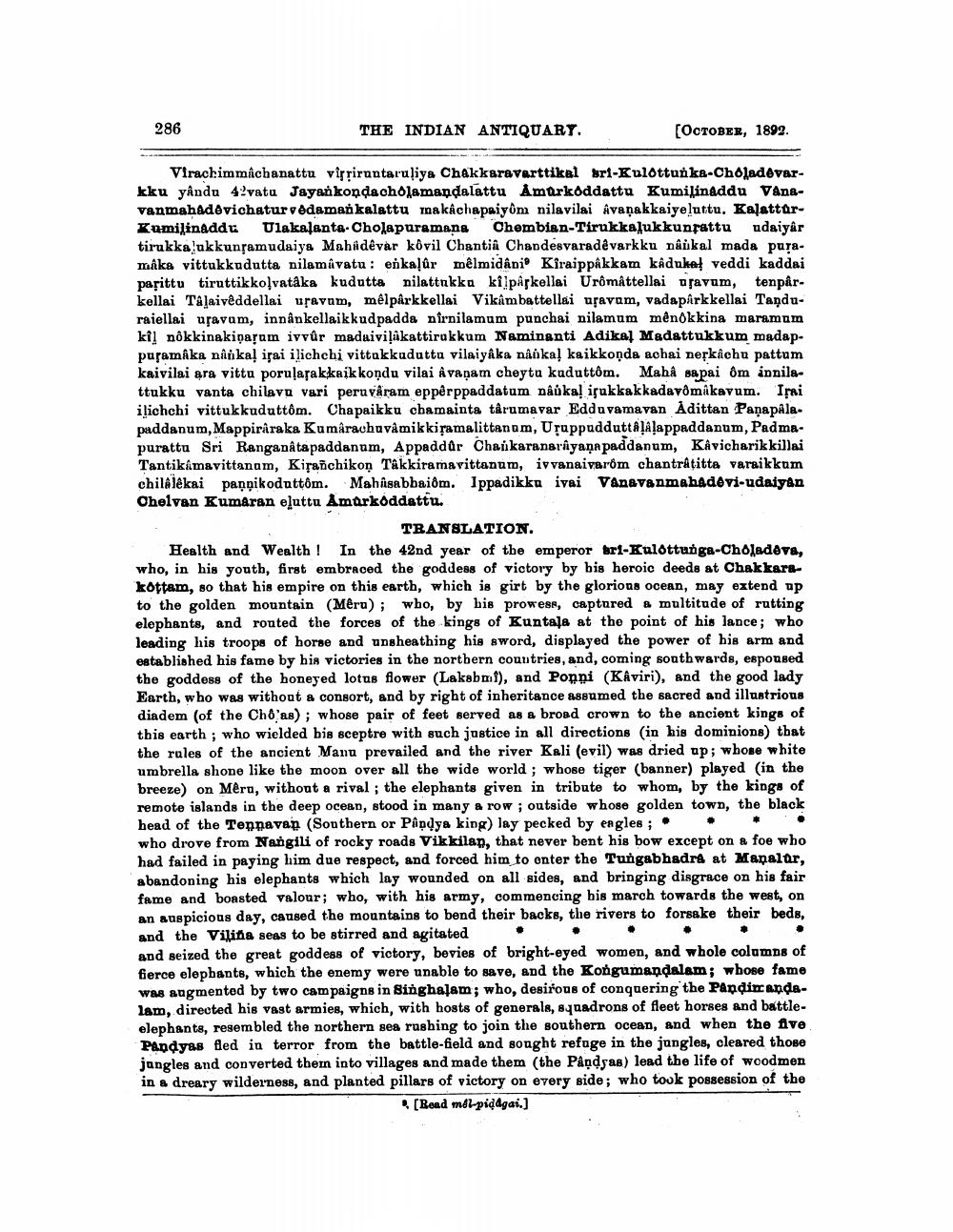________________
286
THE INDIAN ANTIQUARY.
[OCTOBER, 1892.
Virachimmachanattu viriruntaruliya Chakkaravarttikal bri-Kulottunka-Choladevarkku yându 4 vatu Jayankondacholamandalattu Amorkoddattu Kumilinaddu VanaVanmahadevichaturvedamankalattu makâchepaiyom nilavilai Avanakkaiyeluttu. KalatturKumilinaddu Ulakalanta Cholapuramana Chembian-Tirukkalukkunrattu udaiyar tirakkalukkunpamudaiya Mahidêvår kóvil Chantiâ Chandesvaradêvarkku nâukal mada puramaka vittukkudutta nilamivatu: enkasûr mêlmidâni Kiraippakkam kâduket veddi kaddai pasittu tiruttikkolvataka kudutta nilattakka kilpåskellai Urômåttellai apavum, tenpårkellai Talaivèddellai usavam, mêlparkkellai Vikâmbattellai usavam, vadaparkkellai Tanduraiellai uravum, innankellaikkudpadda nirnilamum punchai nilamum mênákkina maramum kil nokkinakinaram ivvür maduiviļakattirukkum Naminanti Adikal Madattukkum madappuram ka nankal irai ilichchi vittukkuduttu vilaiyâka naokaļ kaikkonda achai nepkichu pattum kaivilai ara vittu poruļasakkaikkondu vilai Avaṇam cheyta kaduttôm. Mahå sapai ôm innilattukku vanta chilavu vari peru vâram eppêrppaddatum nâokal irukkakkadavômikavum. Irai ilichchi vittukkuduttôm. Chapaikku chamainta târumavar Eddu vamavan Adittan Panapalapaddanum,Mappirâraka Kumarachovámikkiệamalittanom, Ușuppuddutta!Alappaddanum, Padmapurattu Sri Ranganâtapaddanum, Appaddûr Chankaranarayanapaddanum, Kåvicharikkillai Tantikimavittanam, Kirañchikon Takkiramarittanam, ivvanaivarom chantrâțitta varaikkum chillēkai pannikoduttôm.Mahasabbaiðm. Ippadikku ivai Vanavanmahadevi-udaiyan Chelvan Kumaran eluttu Amarkóddattu.
TRANSLATION. Health and Wealth! In the 42nd year of the emperor br1-Kulottunga-Chbladera, who, in his youth, first embraced the goddess of victory by bis heroic deeds at Chakkarakottam, so that his empire on this earth, which is girt by the glorious ocean, may extend op to the golden mountain (Mēru); wbo, by bis prowess, captured & multitude of rutting elephants, and routed the forces of the kings of Kuntala at the point of his lance; who leading his troops of horse and unsheathing his sword, displayed the power of his arm and established his fame by his victories in the northern countries, and, coming southwards, esponsed the goddess of the honeyed lotus flower (Laksbmi), and Ponni (Kåviri), and the good lady Earth, who was without a consort, and by right of inheritance assumed the sacred and illustrious diadem (of the Ch'as) ; whose pair of feet served as a broad crown to the ancient kings of this earth; who wielded his sceptre with such justice in all directions (in his dominions) that the rules of the ancient Manu prevailed and the river Kali (evil) was dried up; whose white umbrella shone like the moon over all the wide world; whose tiger (banner) played in the breeze) on Mêrn, without a rival; the elephants given in tribute to whom, by the kings of remote islands in the deep ocean, stood in many a row ; outside whose golden town, the black head of the Tennavan (Southern or Pandya king) lay pecked by engles; . . who drove from Nangili of rocky roads Vikkilan, that never bent his bow except on a foe who had failed in paying him due respect, and forced him to enter the Tungabhadra at Manalar, abandoning his elephants which lay wounded on all sides, and bringing disgrace on his fair fame and boasted valour; who, with his army, commencing bis march towards the west, on an auspicious day, caused the mountains to bend their backs, the rivers to forsake their beds, and the Vilina seas to be stirred and agitated . and seized the great goddess of victory, bevies of bright-eyed women, and whole columns of fierce elephants, which the enemy were unable to save, and the Kongumandalam; whose fame was angmented by two campaigns in Singhalam; who, desirous of conquering the Pandirandalam, directed his vast armies, which, with hosts of generals, squadrons of fleet horses and battleelephants, resembled the northern sea rushing to join the southern ocean, and when the five Pandyas fled in terror from the battle-field and songht refuge in the jungles, cleared those jangles and converted them into villages and made them (the Pandyas) lead the life of woodmen in a dreary wilderness, and planted pillars of victory on every side; who took possession of the
[Read mél-piądgai.]




